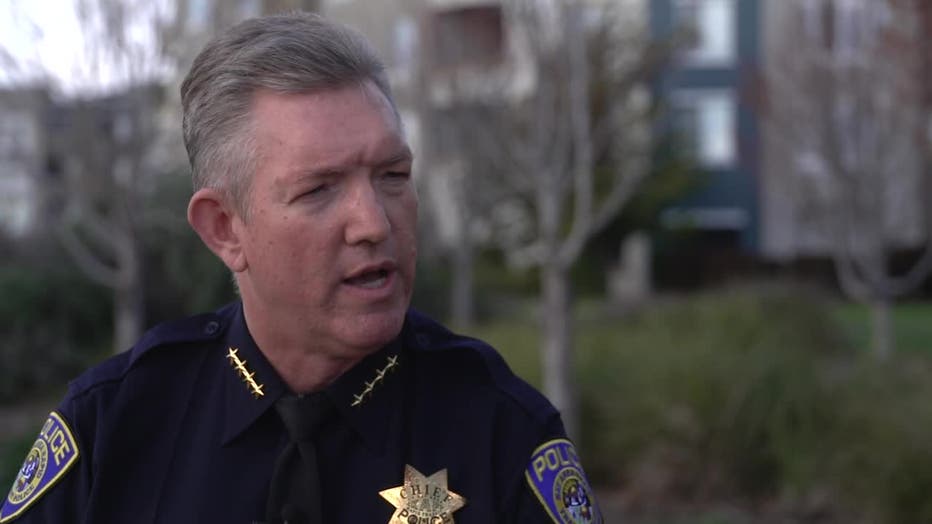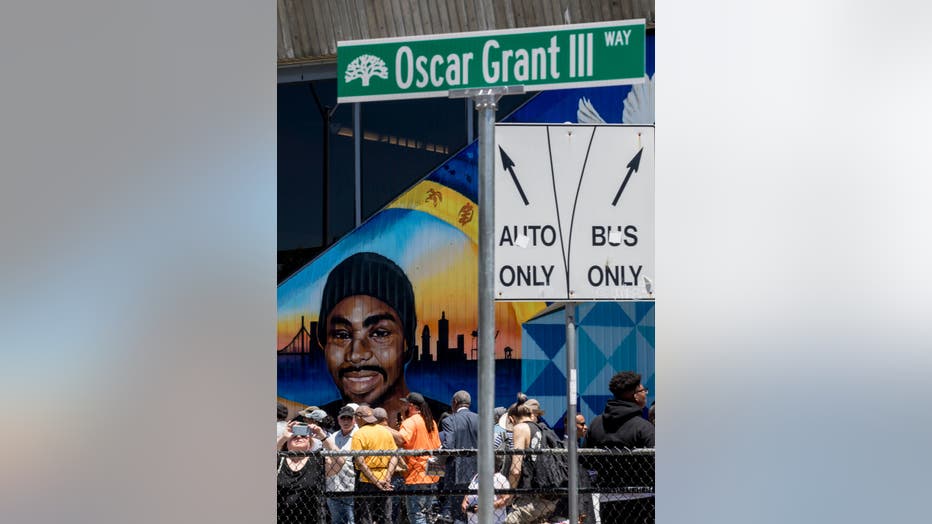Reflecting on Oscar Grant: 15 years of remembering and resilience
Remembering Oscar Grant 15 years later
This Tuesday is Oscar Grant Day in the City of Oakland on what would have been his 38th birthday. He was 22 when he was shot and killed by BART police in the early hours of New Years Day in 2009. It has been more than 15 years since his killing marked a watershed moment in Bay Area Black history. We spoke with Grants family and to police to learn what has changed since his death.
OAKLAND, Calif. - New Year’s Day: A day celebrated by billions worldwide symbolizing renewal, rebirth; an opportunity for second chances. However, for one Oakland family, it’s a day forever tainted by the death of their son, their nephew, their father, Oscar Grant.
Feb. 27, 2024 marks what would have been Grant's 38th birthday. Now, it's known as Oscar Grant Day and he's forever 22.
Fifteen years ago on Jan. 1, 2009, Oscar Grant was killed at the Fruitvale BART station by former BART police officer Johannes Mehserle while face down against the pavement, with his arms pulled behind his back, prepped to be handcuffed.
It was a killing that sent shockwaves not just through Oakland, but the country. These shockwaves are still felt years later.
"Every year we’ve been at the BART station where it happened since, doing a vigil, letting the community not forget what happened with Oscar," said Wanda Johnson, Oscar Grant’s mother.
Wanda Johnson remembers that day vividly. It was her birthday the night before, and she was surrounded by loved ones, including her son. Just hours later, the family would reunite again, only this time, at a hospital.
She wrote "Life After Loss," a book that helps those to heal from their grief. Ms. Johnson was inspired by the death of her son and the reactions of those who loved him.
"Watching Oscar's friends changed my whole total perspective on what we talk about when we talk about PTSD or internalized trauma…I watched them self-medicate and desired not to have that happen to anyone else," she said.
Fifteen years later, his death would create reforms in policing in California nationwide and serve as a precursor of the Black Lives Matter movement.
"'What can I do to take this sad legacy of my nephew being murdered into a positive step-up change?'" Cephus "Uncle Bobby" Johnson asked himself. "And that became the silver lining in my motivation to bring about real systemic change concerning police violence, not just here in Alameda County, but in this country."
Mr. Johnson, affectionately known as "Uncle Bobby," is Wanda's brother and uncle to Grant. He recounts the moments hours before Grant's death, feeling something troubling his spirit that implored him to reach out to his nephew.
He texted Grant's phone at 12:40 that morning, saying "Uncle loves you. God Loves you. God loves your family."
"And an hour and a half later, he was murdered," he said.
Instead of remaining angry and destructive, Mr. Johnson turned those emotions into motivation to ensure Oscar's death wouldn't be in vain.
"[The community] were able to stand firm enough to be able to see forward, to begin that journey of getting justice for Oscar, but also trying to transform a system that seems to have been so ill in this egregious act and killing people specifically of color," he said.
While the Black Lives Matter movement is believed to have started in 2013, stemming from Trayvon Martin's death, Oaklanders were "shouting back then, ‘Black Lives Matter,'" according to Mr. Johnson.
"Oscar's murder really is the flashpoint of the movement that we see today…We have to understand that this whole inference of this movement today that we know as Black Lives Matter really was birthed in the murder of Oscar Grant," he said.
Grant wasn't the first unarmed Black man killed by police. But what makes his killing unique is that it's believed to be the first police shooting caught on a cell phone camera and going viral.
"Never had it been caught on cell phone video," said Mr. Johnson. "Not only that, had it not been for the video, none of us would know who Oscar Grant is."
"Holding officers accountable would not, probably, be as far as it is without it starting with Oscar and the community, being a voice to talk about the injustice of what happened," said Wanda Johnson, the victim's mother.
Since Grant's death, changes within BART police were made to prevent history repeating itself.
"[Grant's death] was a turning point for us…everything we've done since that time in terms of, our community engagement, in terms of our training, our equipment, our transparency and accountability has been as a result of that tragedy," said BART Chief of Police Kevin Franklin.
Franklin was in leadership with the agency during that time, serving as a lieutenant and working that night at the West Oakland station. While he was not a part of the investigation, he notes the death as a "monumental situation."
"The death of Oscar Grant was an inflection point for the agency, and definitely drove the changes that needed to be made," Franklin said.
Grant has been forever memorialized in California politics and policing. In the years after his death, different bills have been championed in the State Senate, including Assembly Bill 1586, nicknamed the "Oscar Grant Bill."

Kevin Franklin, BART chief of police. Franklin was a lieutenant at the time of Grant's death, working at the West Oakland station. Franklin spoke with KTVU about changes BART went following Grant's death Jan. 1, 2009.
AB-1586 became law the year following Grant's death, and it requires a citizen oversight committee with an independent police auditor and citizen review board, with the backing of the Grant-Johnson family.
BART police also became one of the first agencies in the country to implement body-worn cameras in 2012.
The "Right to Know" Act was passed in 2018, requiring agencies to disclose records of police misconduct and use of force. AB-748 took effect in 2019, requiring police agencies to release audio and video of critical incidents.
In 2020, the Use of Force Bill became the strictest use of force legislation in history, changing the standard for the legal use of police force.
In 2021, the chokehold bill was passed, paving the way for a change in restraint practices. And in 2023, Gov. Gavin Newsom appointed Cephus Johnson to a police accountability board.
"He could have been choked to death like George Floyd. The same knee that was on George Floyd was on Oscar's neck," said Cephus Johnson.
His life has also been depicted in the award-winning film "Fruitvale Station" starring Michael B. Jordan. The film was also the directorial debut of Oakland native Ryan Coogler.
It shows the final 24 hours of Grant's life and the immediate afterlife. But had he not been killed, Grant would be fulfilling his goals, his mother Wanda Johnson said.
"If he was living today, I know that he would have fulfilled his goal as being a barber…he wanted to move to Livermore with his family…[Grant and fiancée Sophina Mesa] would have more than just one child together…he would have been that hard-working father, providing for his family," she said.
BART police were asked if the changes that swept through the agency could've prevented Grant's death.
"It's impossible to know what could have been prevented. But I know that the training improvements that we have made are essential in avoiding another situation like that in the future," said Franklin.
"This 15-year anniversary of Oscar's legacy…it's a blessing because his name still reverberates throughout, not just here in the Bay Area, but through this country," said Mr. Johnson. "We hope that this really brings some real change."

A large mural is seen behind a street named after the late Oscar Grant during a formal unveiling at Fruitvale Station in Oakland, Calif. Saturday, June 8, 2019. (Photo by Jessica Christian/San Francisco Chronicle via Getty Images)

